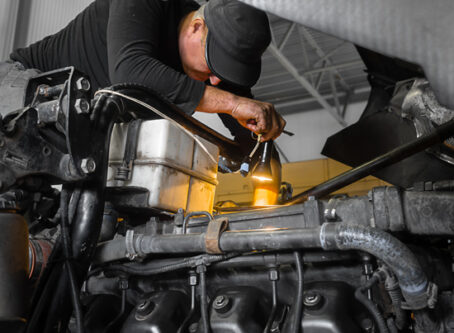Bills in seven states call for speed limit changes
Pursuit ongoing at statehouses from Oregon to West Virginia would revise speed limit rules. Legislation includes the elimination of speed limit differentials for cars and trucks and increased speeds for all vehicles.
The Owner-Operator Independent Drivers Association says roadways are safest when all vehicles are allowed to travel at the same rate of speed. The Association does not advocate for a specific speed limit.
Indiana
The state getting the most attention for its speed limit legislation is Indiana.
Indiana law allows cars to drive 70 mph, while vehicles in excess of 26,000 pounds are limited to 65 mph.
The Senate Homeland Security and Transportation Committee voted last week to advance a bill to do away with the speed limit differential on the state’s fastest roadways. Specific roadways affected would be rural stretches of interstate and on the Indiana Toll Road.
Sen. Jim Tomes, R-Wadesville, told the committee it simply makes sense to adopt uniform speeds for all vehicles.
“The logic behind it is if everyone is flowing at the same speed, traffic moves better, and you don’t have people stacking up on each other getting behind a slower-moving vehicle,” Tomes said. “I’m thinking this makes sense to let these trucks run even speed with cars and pickup trucks.”
The bill, SB13, has moved to the full Senate. Sen. Mark Messmer, R-Jasper, has been added as a lead sponsor. Five more legislators are listed as co-sponsors.
Doug Morris, OOIDA director of safety and security operations, says speed differentials are based on a flawed belief that slower trucks equal safer trucks. He adds that is simply not the case.
“It’s encouraging to see the legislative pursuit in Indiana to correct a law that was flawed in nature and did nothing to improve highway safety,” Morris said.
New York
New York permits all vehicles to travel 65 mph on interstate highways and other limited access roads.
One Senate bill would bump authorized speeds for cars and trucks to 70 mph.
Sen. Tom O’Mara, R-Big Flats, wrote in a bill memo the change would keep New York in line with maximum speeds in many other states.
“The majority of states across the country have state speed limits that exceed 65 mph,” O’Mara wrote. “New York has failed to keep up with the rest of the country by not adopting a more efficient speed limit.
“This bill would correct this inefficacy by allowing for a 70 mph speed limit where appropriate.”
The bill, SB2209, is in the Senate Transportation Committee.
North Dakota
North Dakota House lawmakers have approved a bill to increase speed limits for all drivers along certain highways.
State law authorizes speeds of 75 mph on Interstates 29 and 94. Speeds along four-lane divided highways are set at 70 mph. Two-lane highways are posted at 65 mph.
Sponsored by Rep. Ben Koppelman, R-West Fargo, HB1475 would authorize vehicles to travel 80 mph on interstates.
Advocates at the statehouse say the change would allow for more efficient travel through the state. Koppleman adds that six nearby states already permit 80 mph travel.
Critics have concern about drivers using the proposed threshold to further push the limit in excess of 80 mph.
Koppleman says that simply is not true.
“Studies have shown that as speed limits increase, drivers do not necessarily increase their speed by the same amount,” he testified in committee. “The bottom line is people drive the speed that they feel safe and comfortable at, not the speed limit.”
Others worry that many large trucks have their speed governed and a wider speed gap would result between affected trucks and other vehicles.
The bill has moved to the Senate Transportation Committee.
Oregon
A 2-year-old state law permits Oregon cities to apply for the authority to designate speed limits on local roads. The same authority is given to Clackamas and Multnomah counties.
The state Department of Transportation is responsible for delegating which locales receive the authority to set speeds on roads under their jurisdiction. Speeds must be set under criteria adopted by the highway agency.
One House bill would add Marion County to the list of counties with jurisdiction to designate speeds on highways within the county’s jurisdiction.
Marion County includes the city of Salem.
The bill, HB3188, is in the House Transportation Committee.
South Carolina
One South Carolina House bill addresses concern about slow-moving traffic on the state’s fastest highways.
State law prohibits slow-moving vehicles from impeding “the normal and reasonable movement” of traffic. Exceptions are made for when reduced speed is necessary for safe operation or in compliance with law.
The South Carolina DOT and local authorities are also authorized to establish minimum speed zones. Affected areas can be set when an engineering and traffic investigation shows that slow speeds on a portion of highway consistently impede the normal and reasonable movement of traffic.
Sponsored by Rep. J. Todd Rutherford, D-Richland, H3364 would raise the minimum speed limit along the state’s interstates. Specifically, the bill reads that along highways with a maximum posted speed of 70 mph the minimum speed would be 50 mph – up from 45 mph.
The state DOT previously estimated that about 230 signs would be needed to post a new minimum speed limit. The cost was estimated at $200,000.
The bill is in the House Education and Public Works Committee.
Texas
Speed limits are also a topic of multiple Texas bills.
The first bill would authorize the use of variable speed limits.
Variable speed limits use speed limit signs that change to slow drivers to avoid creating heavy traffic congestion. The Texas A&M Transportation Institute provides information on how the process works.
HB1885 would allow the temporary lowering of a speed limit to address inclement weather, congestion, road construction, or any other condition that affects “orderly movement of traffic.”
The bill clarifies that variable speeds must be based on an engineering and traffic investigation.
Variable speeds could not be set less than 10 mph below the posted speed limit.
A nearly identical bill, HB1639, does not include the 10-mph provision.
West Virginia
If one West Virginia state lawmaker gets his way, the maximum speed limit on rural portions of interstate would get a bump.
State law permits 70 mph travel on rural interstates. In 2019, a House resolution approved by the legislature gave the West Virginia Department of Transportation authority to increase the speed limit on interstate highways from 70 mph to 75 mph.
Sen. Robert Karnes, R-Randolph, has introduced a bill to authorize 80 mph speeds on interstate highways and four-lane, limited-access highways. The bill provides an exception for portions of those roadways passing through the city limits of municipalities.
The bill, SB34, is in the Senate Transportation and Infrastructure Committee. LL









